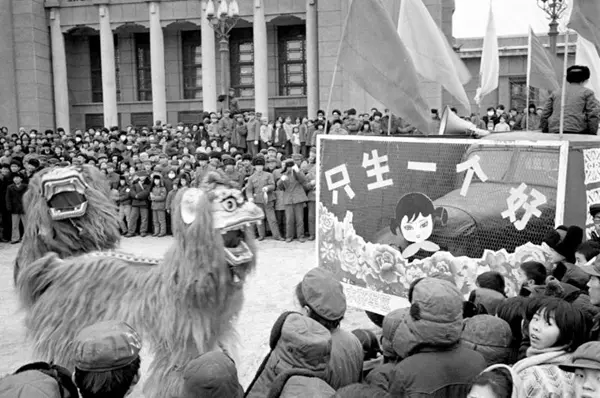China's two-child messages recommended to encourage couples to have a second baby.
Solemn-faced couples holding a hammer and a sickle were a common sight in the early 1980s, when China introduced its one-child policy. They looked out of posters above a red slogan proclaiming, "Controlled population, planned growth".
More than three decades later, Chinese newspapers are displaying photos of smiling parents carrying two infants with the banner "Home with two kids".
People view an exhibition of posters on the country's one-child policy in the 1980s. XINHUA
In January, China ended its one-child policy and allowed all couples to have two children. The new policy is expected to bring sweeping social changes.
But the slogans have yet to catch up with the new family-planning regimen, said members of China's top advisory body.
Zhu Lianqing, along with 40 other members of the National Committee of the Chinese People's Political Consultative Conference, offered a proposal to modernize outdated slogans promoting birth control and improve family planning services to boost fertility during the CPPCC's annual meeting in March.
An old poster with a new family planning slogan is found on the Web. XINHUA
Ominous messages
In the world's most populous country, childbearing is not a private issue among families. It has long been viewed as a "revolutionary task" in the national interest.
In the early 1980s, red banners that declared the family planning policy, like Chairman Mao's famous quotations, bedecked city streets; in the countryside, slogans were painted on walls and buildings.
Families that violated the one-child policy were branded "guerrillas", and they sometimes hid to escape huge fines or other penalties.
Traditionally, perpetuating the bloodline is seen as a virtue in China. When New China was founded in 1949, the country was very poor and underdeveloped and the "more people, more power" idea was widely accepted. The population exploded from 540 million in 1949 to 830 million by 1970. The contrast sharpened between limited land and the massive population.
Fearful that uncontrolled growth would restrict economic development, China started strict implementation of a one-child policy, mostly among its urban population in the late 1970s to deal with the population pressures.
Family planning slogans reflected living and production conditions: "Bear fewer children, and plant more trees" or "Raising more children is not as good as raising more pigs".
Some were more ominous, such as "One more baby means one more tomb" and "Uncontrolled births cause houses to collapse".
In 2007, the government softened the tone with new phrases: "For Mother Earth, control childbirth" and "Fewer and healthier births make the countryside prosperous". Some stressed gender equality: "Boys and girls are equally important" and "Girls matter to the nation's future".
Yet all "still strongly reflected the one-child policy", said Zhu, of the CPPCC.
According to official data, the one-child policy was estimated to result in the prevention of 400 million births, and China's population dropped from 22 percent of the global population in the 1970s to 19 percent by 2010.
Outdated content on the issue also appears in textbooks, he said, citing a paragraph in an elementary textbook in Zhejiang province that states: "From 1971 to 1998, the one-child policy resulted in a reduction of population, which saved 7.4 trillion yuan in child-rearing costs, almost equal to China's GDP in 1997."
"It's ridiculous," Zhu said, suggesting that if schools teach the idea that "fewer births can save money", children would wrongly believe they were worthless.
An old poster with a new family planning slogan is found on the Web. XINHUA
Today, people are China's most needed resource. While getting wealthier, the world's most populous country is also aging, with 220 million people aged 60 or older.
Premier Li Keqiang, in his Government Work Report, noted that China has a labor force of 900 million, including 100 million who have received higher education or are professionally trained. "This is our greatest resource and strength," he said.
Ironically, Chinese are now less inclined to take on the costs of more children.
Last year, births numbered 16.55 million, a drop of 320,000 from 2014, accounting for just 12 percent of the world's newborns. Demographic experts predict that the second-child policy will result in only 3 million more babies every year.
New Slogan!
An old poster with a new family planning slogan is found on the Web. XINHUA
Family planning slogans are now needed to help reverse this trend and they should be "more interesting, vivid, and well received", said Zuo Dongling, a deputy of the National People's Congress.
Social media is buzzing with tongue-in-cheek suggestions such as "Two babies rewarded; one baby fined; DINKs arrested", referring to those couples with "double income, no kids".
Zhu Lianqing suggested the government learn from neighboring countries, such as South Korea, which encourages its people with slogans like "Dad, I'm lonely, and I want more brothers and sisters", "More kids, better lives", and "The biggest legacy for children is siblings."
But just improving slogans is not enough for some. "Without improved services or polices, people will not have the courage to have more children-no matter how good the slogan," said Zhang Jingping, a working mother of two.
Other parents echoed her thoughts. Yu Li, a sales manager in the communications industry, who has two girls, wants preferential policies on school enrollment, and car and home purchases, as they are the most expensive and stressful requirements for raising children in large cities.
(CHINA DAILY)
 简体中文
简体中文





